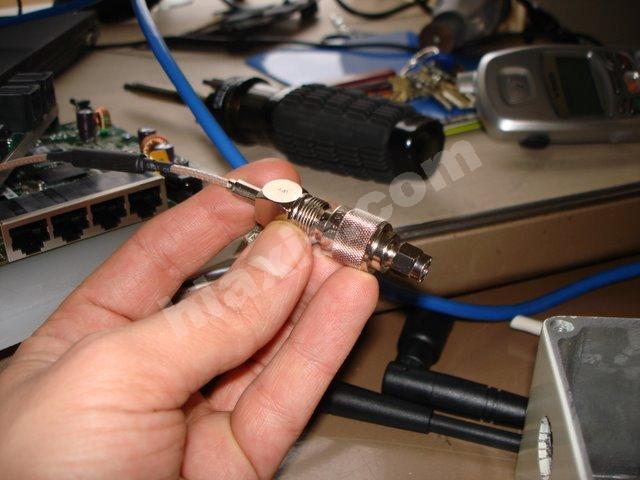Step 2 - Get the Goods
For this project we will need the following items:
Wireless
Ethernet
Bridge
A network bridge is a device which "bridges" two networks together so they can
communicate directly with each other. In our scenario, we will be bridging
the neighbor's public wi-fi hotspot with our home network. Linksys makes
wireless ethernet bridge products, but according to Amazon's reviews they are
not necessarily the best on the market.
Wireless
Access
Point
We want to be able to use our new internet connection (via the neighbor's wi-fi
hotspot) from anywhere in the house, so we'll do this with a wi-fi router, also
known as a "wireless access point".
POE
Adapter
Kit
Power Over Ethernet is a rather clever way to get electricity to networking gear
when installing an electrical outlet or running a long extension cord is out of
the question. Category-5 ethernet cable, the standard network cable we all
use on a daily basis for nearly all computer networks, has eight individual
wires inside which fan out into the plug at the ends. You can see each
wire if you look through the clear plastic on the tip of any network
cable. Only four of those wires are used for network communications in
standard environments, so clever engineers have built devices which can transmit
low voltage DC power over some of the other, unused wires. This makes for
a great way to get power to networking gear when it's installed in, say, your
attic so it is as close to your directional wi-fi antenna as possible.
Directional Antenna
You can either build your own, buy an inexpensive one, or buy a really fancy
one. The choice is yours, and probably will be dictated somewhat by your
budget.
Mounting Hardware for antenna
This will depend greatly on your unique situation, but you will probably need a
mast and some way to affix that mast to your home. There are all kinds of
mounting devices - chimney mounts, vertical wall mounts, roof mounts, etc.
Many devices come with wall mount hardware, so this may be a redundant
step. We recommend
this
site to find mounting hardware and many other wireless networking goodies.
 Pigtail/Coax connectors
Pigtail/Coax connectors
We want to keep the coax connection between your directional antenna and the
bridge as short as possible to reduce signal loss. That's the whole point
in using the POE device in lieu of an extra long coax cable. Also POE is
way more interesting than a lossy length of coaxial cable. You can obtain
the proper length and type of coax antenna cable from the same place you get
your antenna. For details please see
this
informative article. Also, Fab-Corp is an excellent place to get
adapters, connectors, coax stuffs, and other geeky items you may need for this
type of project.
Extra
CAT-5e Cable
Lengths
You'll need enough network cable to reach, easily, from your
Access Point to the
Bridge. Make sure you get enough,
but try not to go more than 300 feet.
Power Screwdriver
If you don't have one, and you're not limited in your budget, you absolutely,
positively, no matter what,
MUST
HAVE one of
these.
It is by far the very best power screwdriver ever created, and no
handyman/hobbyist/homeowner should go without one. You need this.
Trust me. I'm not messing around here. You will seriously be
emailing me when it shows up because you can't figure out how you were ever able
to survive without one.
Mounting hardware for ethernet devices
This isn't actually a requirement, but everything is so much nicer when it's
wall mounted. Get whatever screws or shelf unit or whatever to make it
mount up all nice and out of the way. Some devices come packaged with
wall-mounting hardware.
<<< Previous Page | Next Page >>>